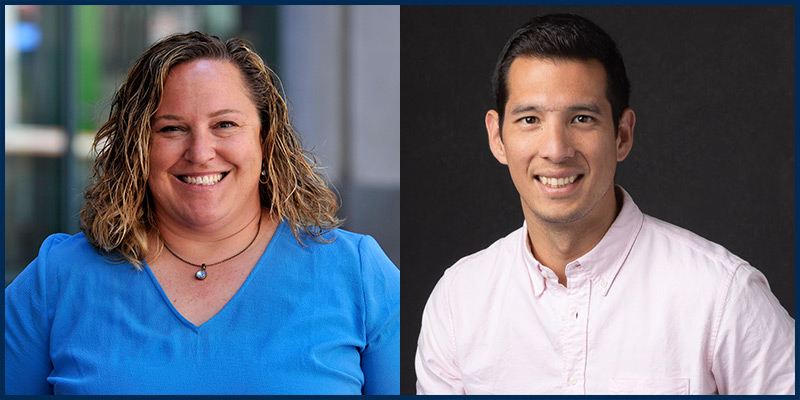
Creating a Workplace for All Abilities and Disabilities
FedAble
October 15, 2020
Briana Krieger-Maddalena once supervised a summer intern who doodled through meetings and conversations.
When Briana noticed the drawing, she wasn’t too concerned: she knew that people doodle for a variety of reasons. It didn’t necessarily mean her intern was uninterested or not paying attention.
The intern later told Briana that she had attention-deficit/hyperactivity disorder (ADHD). Drawing certain shapes and symbols helped her remember the conversation. That got Briana thinking about disabilities, particularly those that easily go unnoticed in a workplace, like ADHD or posttraumatic stress disorder (PTSD). Briana herself has anxiety and depression.
“I talked to my manager about what kind of sensitivities we need to have around managing people with disabilities, visible or invisible,” says
The conversation prompted Briana to attend her first event a few years ago with FedAble, an employee resource group (ERG) dedicated to championing people with disabilities and educating others about their capabilities. The panel, featuring two Fed employees, was about people who had been diagnosed with a disability as an adult, or who were parents of children with special needs.
Now Briana is a co-chair of the group. In addition to putting on events like the one she attended, she’s co-leading an initiative to hire more neurodiverse and physically diverse people at the San Francisco Fed.

All are welcome
FedAble, which was started in 2016, has 112 members. Some have disabilities, while others are parents of children with disabilities or have family members with disabilities. The group gives members a space to be authentic and open about what they’re going through, as well as to participate in and lead events regarding their different needs.
There are also members like Oscar Caicedo-Wong, who has deep empathy for people who need workplaces to become more accessible. That’s what led him to be an advocate and ally, and to also to become the other co-chair of FedAble.
One experience Oscar can empathize with is loneliness. One British study found that 50 percent of people with disabilities report feeling lonely on any given day. When Oscar came to the U.S. from Ecuador for college on a soccer scholarship, he too felt isolated and alone. Plus, he was still learning English. It was frustrating to communicate with his classmates or professors, he remembers.

“I have an uncle and nephew who have developmental disabilities. I can understand the hurdles someone with one might have to go through to be heard,” Oscar says. He wants to lend a hand to those who might still be finding the best way to communicate.
“I’ve always been passionate about helping wherever is needed,” he says. “If I can help others, learn about them, and use my voice as a powerful tool to bring awareness to different issues, then why not?”
What it might feel like
FedAble hosts events throughout the year to celebrate people with disabilities and to shed light on issues they face. For example, in 2018, the ERG hired the band The Dream Achievers, made up of talented performing artists with autism, to play in the cafeteria of San Francisco Fed headquarters. The band’s eclectic set spanned contemporary, jazz, hip hop, and other genres. Employees made a point to come listen and enjoy the live music, a special occasion at the SF Fed that served a dual purpose of growing autism awareness.

For the ERG Fairs in 2018 and 2019, FedAble created a pop-up exhibit that allowed people to experience what it might be like to have visual impairment or tactile impairment. Participants could put on a glasses with various lenses that blur vision, giving a sense of limited vision. And by putting on a pair of stiff gloves, people could experience a loss of dexterity, as someone with rheumatoid arthritis might. The gloves, reinforced with wire, made it difficult to perform activities like gripping and typing. Participants were asked to try to type a message on a keyboard at the booth.
“People were like, ‘I had no idea that someone with a motor disability has to go through this,’” says Oscar, an IT vendor manager at the Bank. “The event was pretty educational.”
Hiring for all abilities
In addition to educating SF Fed employees, FedAble wants the Bank to hire more individuals with disabilities. Briana was moved by an article she read about a program called Project SEARCH, which provides one-year internships for students with developmental disabilities.
“It seemed to me that as a community-engaged organization, we should have the capacity and interest to have these types of internships,” Briana says. “That inspired my interest to take a leadership role in FedAble to lead that change within our organization.”

One of Briana’s biggest goals is to expand the talent pool at the Fed, she says. “I’d like to create opportunities to better accommodate individuals with disabilities
FedAble is working with the Bank’s Talent Acquisition Team to identify sources around the Bay Area for potential hiring, such as Berkeley’s Center for Independent Living, a nonprofit that provides people with disabilities skills and resources so they can meet their full potential. In addition, FedAble volunteers have conducted mock interviews with students at CSU East Bay, and are currently partnering with the California Depart of Rehabilitation to help candidates prepare for job interviews.
“The goal wasn’t only to help potential candidates get comfortable with an interview, but also for managers to continue developing their skills in conducting interviews with people with disabilities,” says Oscar. “It’s a two-way street.”
Though in-person efforts have been put on hold because of the COVID-19 pandemic, FedAble is working to create more opportunities to help job seekers, from online resume reviews to virtual mock interviews.
“We are continuing to get our name out there and to help people be prepared to come into the workforce,” Briana says. “We’d love to have them join us at the SF Fed.”